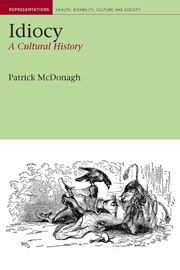Book contents
- Frontmatter
- Contents
- Preface and acknowledgements
- 1 Introduction: idiocy, culture and human relations
- 2 ‘Stripping our own hearts naked’: William Wordsworth and John Wilson read ‘The Idiot Boy’
- 3 A ‘pupil of innocent Nature!’ The wild boy of Aveyron goes to Paris
- 4 Diminished men: masculinity and idiocy
- 5 Essential women: femininity and idiocy
- 6 Holy fools, witty fools, depraved fools: folly, innocence and sin
- 7 History, society, economy: holy fools and idiots come home in nineteenth-century literature
- 8 Barnaby Rudge, idiocy and paternalism: assisting the ‘poor idiot’
- 9 Innocence, philanthropy and economics: the new ‘asylum’ idiot
- 10 Sensational idiocy
- 11 ‘The sins of the fathers’: idiocy, evolution and degeneration
- 12 Danger and degeneracy: the threat of the urban idiot
- 13 The problem of the feeble-minded: the Royal Commission, eugenics and eternal chaos
- Epilogue
- Bibliography
- Index
2 - ‘Stripping our own hearts naked’: William Wordsworth and John Wilson read ‘The Idiot Boy’
- Frontmatter
- Contents
- Preface and acknowledgements
- 1 Introduction: idiocy, culture and human relations
- 2 ‘Stripping our own hearts naked’: William Wordsworth and John Wilson read ‘The Idiot Boy’
- 3 A ‘pupil of innocent Nature!’ The wild boy of Aveyron goes to Paris
- 4 Diminished men: masculinity and idiocy
- 5 Essential women: femininity and idiocy
- 6 Holy fools, witty fools, depraved fools: folly, innocence and sin
- 7 History, society, economy: holy fools and idiots come home in nineteenth-century literature
- 8 Barnaby Rudge, idiocy and paternalism: assisting the ‘poor idiot’
- 9 Innocence, philanthropy and economics: the new ‘asylum’ idiot
- 10 Sensational idiocy
- 11 ‘The sins of the fathers’: idiocy, evolution and degeneration
- 12 Danger and degeneracy: the threat of the urban idiot
- 13 The problem of the feeble-minded: the Royal Commission, eugenics and eternal chaos
- Epilogue
- Bibliography
- Index
Summary
John Wilson would one day rank among Britain's leading cultural and literary critics; he would contribute regularly to Blackwood's Edinburgh Magazine under the pseudonym Christopher North and eventually assume the Chair of Moral Philosophy at the University of Edinburgh. But in May 1802 Wilson was a precocious seventeen-year-old writing a fan letter to poetry's bright new star, William Wordsworth. The epistle reads like an early exercise in Wilson's literary criticism, with his comments on Lyrical Ballads being part analysis and part adulation. ‘[T]hough I am not personally acquainted with you, I may almost venture to affirm, that the qualities of your soul are not unknown to me’, he writes to Wordsworth. ‘In your poems I discovered such marks of delicate feeling, such benevolence of disposition, and such knowledge of human nature as has made an impression on my mind that nothing will ever efface’ (quoted in Brett and Jones 1991: 334). Wordsworth's poetry, he writes, is ‘the language of nature’, written ‘not … merely for the pleasure of philosophers and men of improved taste, but for all who think – for all who feel’ (335). He claims further that the poems ‘are of a very great advantage to the world’, thanks to their ‘system of philosophy’ and ‘morality of the purest kind’, and praises how ‘they represent the enjoyment resulting from the cultivation of the social affections of our nature’ (336).
- Type
- Chapter
- Information
- IdiocyA Cultural History, pp. 24 - 49Publisher: Liverpool University PressPrint publication year: 2008

